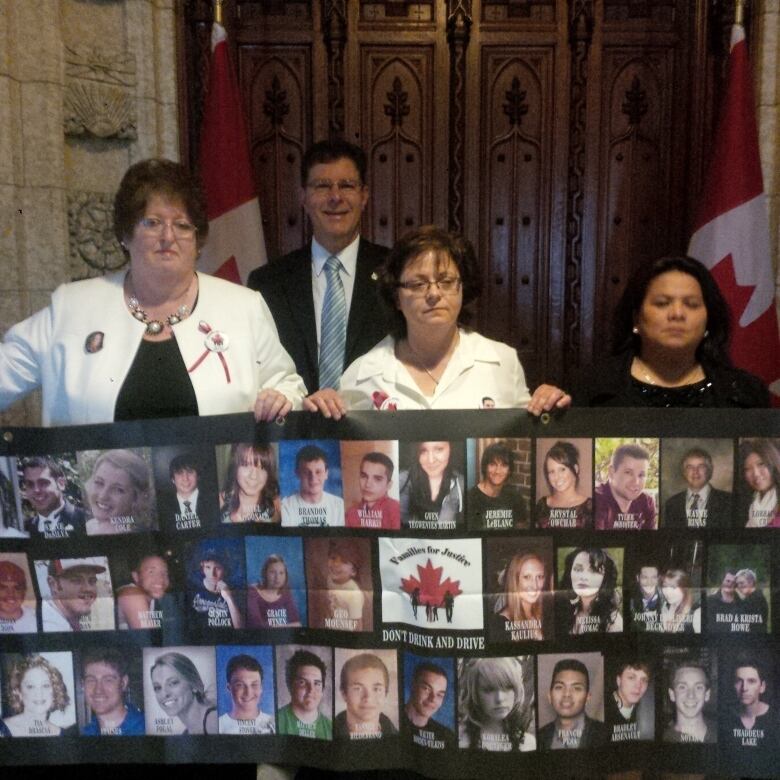Peter MacKay proposes tougher penalties, fewer loopholes for impaired driving
Mothers who lost children called for 5-year minimum sentences, MacKay's bill proposes 6 years
Three mothers who lost their children to impaired drivers were invited to sit in the House of Commons gallery as Justice Minister Peter MacKay introduced new legislation Tuesday to create tougher penalties for drunk drivers who kill people.
The three women Markita Kaulius,SheriArsenault and Grace Pesa were behind a "Families for Justice" petition thatgathered more than 90,000 signatures.

The petition calledfor a five-yearminimum mandatory sentence for anyone convicted of impaired driving causing death.
MacKay's new bill changes the mandatory minimum sentence from a $1,000 fine to six years in prison. Speaking to reporters, MacKay thanked the women and other anti-impaired driving groups for their advocacy.
"The stories of victims and the personal accounts from their families clearly illustrated the need for more action,"MacKaytold reporters.
Drunk driving remains thenumber one criminal cause of death in Canada,MacKaysaid, citing several statistics on the persistence of impaired drivingand his government's efforts to date on the file.
The bill would crack down and send "a strong message to Canadians that they don't tolerate this criminal behaviour and the risk to public safety," he said.
Cases clogging courts
The bill limits several technical defences that contribute to the backlog of impaired driving cases in the court system. The bill would restructure the Criminal Code to:
- Simplify the process for proving blood alcohol levels and tighten disclosure rules around breath testing, eliminating the need for expert evidence and ensuring only scientifically-relevant information must be disclosed.
- Eliminate the bolus drinking defence that allowsa driver to argue that their impairmentwas caused by heavy drinking just before driving that wasn't reflected in their actual blood alcohol level when driving.
- Limit the intervening drinkdefence where a driver claims the blood alcohol level was caused by drinking after driving.
The bill also harmonizes and strengthens penalties for all transportation-related offences so that penalties increase for repeat offenders.
In addition to the new mandatory minimums, the maximum penalties for offences not causing bodily harm would double from five years to ten years for an indictable offence, and from 18 months to two years for a summary conviction.
Whenimpaired drivingcauses bodily harm, a conviction would have a maximum penalty of 14 years imprisonment. Mandatory minimumpenalties would increase from a $1,000 fine to 30 days in prison for a summary conviction and120 days in prison for an indictable offence.
Thecurrent maximum sentence for impaired driving causing death is life in prison.
Conservative MPs James RajotteandMarkWarawajoinedMacKayfor thepress conference that followedthe bill's tabling.
The pair, along with colleague Randy Hoback,had lobbied their governmentandintroduced their own legislative initiatives to stiffen penalties prior to the introduction of thegovernmentbill.
"To say this bill has been a long time in the making is an understatement," MacKaysaid.
Legislation passing will have to wait
With the session set to end next week, thenew legislationwill not pass before Parliament rises for the summer.

The bill took a "tremendous" amount of drafting, he said, and bringing it forward now is better than the alternative.
"Could we and should have done it sooner?Probably," he admitted to reporters, emphasizing that this part of the Criminal Code must be modernized.
Down the road, the ministersaid, the federal government would also consultwidely on newpenalties for drivers foundimpaired by drug use.
Sheri Arsenault of Beaumont, Alta., was among those invited to bein the CommonsTuesday.She lost her 18-year-old son, Bradley, in a horrific crash in November 2011.Two of his friends were also killed in the collision.
Jonathan Pratt was convicted of three counts of manslaughter and impaired driving causing death. He was given an eight-year sentence and a lifetime driving prohibition.
Arsenault met with MacKay in the past to advocate for stiffer penalties.
"You know, it's time that this is recognized as a serious crime and alcohol cannot become the excuse," she said.














_(720p).jpg)


 OFFICIAL HD MUSIC VIDEO.jpg)
.jpg)



























































































